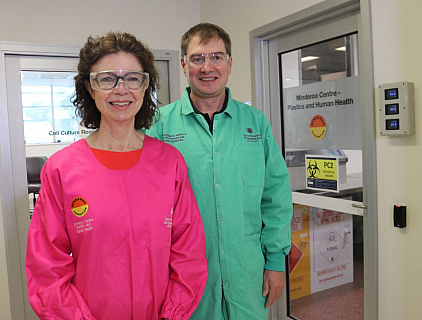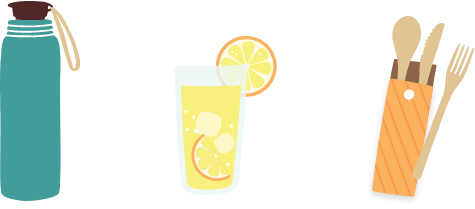Expert top tips – why reducing plastic is better for your health
Guest Author | 16 June 2022
With evidence mounting that plastic isn’t only in our environment but is now in our bodies, we have partnered with the Plastics and Human Health team at Minderoo Foundation and will be sharing their tips throughout Plastic Free July.
Professor Sarah Dunlop, neuroscientist and Head of Plastics and Human Health at Minderoo Foundation shares how she reduces her exposure to plastic and the harmful chemicals it can contain.
More than meets the eye
The recent findings of microplastics in blood and lungs are not surprising, but there’s much more to learn and share about plastic as a health issue.
Over the last decade there has been a growing awareness of the extent of plastic pollution, its devastating impacts on animals and the environment, as well as the challenges in collection and recycling. Now, there’s increasing concern about the potential human health impacts of plastic, from certain chemical additives as well as the tiny microplastics particles that have recently been found in the human body.
My colleagues, led by Dr Christos Symeonides at Minderoo Foundation, recently published a review article ‘Buy-now-pay-later: Hazards to human and planetary health from plastics production, use and waste’ in the Journal of Paediatrics and Child Health on this issue. Plastics contain thousands of chemicals and many of them have not been tested for safety to people. This also means that in most places, government regulations do not to protect us from these chemicals.
There is significant evidence, from human studies, that exposures to two types of chemicals found in plastics — phthalates and bisphenols — can affect health, especially if the exposure occurs during pregnancy or in early childhood.
However, we don’t yet have a strong understanding of the effects of micro- and nanoplastic particles in our bodies, which is why we partnered with The University of Queensland to build the Minderoo Centre – Plastics and Human Health research centre. The science of measuring these virus-sized particles requires highly specialised equipment and experts, such as Professor Kevin Thomas and his team.
What can we do?
Our scientific studies, and those of our international peers, have convinced us all to avoid food and drink contact with plastic where possible, especially when they are heated.
Other ways we can reduce risks of chemical exposure, are to start with simple things — avoiding cooking or warming food in plastic, and not putting plastic in the dishwasher. We could eat fewer packaged foods or processed foods and use glass containers for food instead.
As well as avoiding plastic products, other things I do to decrease exposure to harmful plastic-associated chemicals in my home, include:
- regular vacuuming and dusting
- not using personal care products that contain plastic microbeads
- avoiding cosmetics listing the ingredient ‘fragrance’, which often use phthalates as a solvent or stabiliser
- using stainless steel or ceramic coffee cups.
Children and young people
Young children have additional exposure through oral exploratory behaviour and incidental ingestion, including chewing their toys and from chemicals in household dust and soil.”
As a paediatrician, Christos also encourages alternative materials for baby’s toys – that are likely to go in their mouth.
It’s safer to choose ones made of wood (without toxic paint), natural latex or food grade silicone. Look for the EU safety mark for children’s toys. Since 1999, all commonly used phthalate plasticisers were banned in toys made in Europe.
Our mission
What is important to me, and the plastics team at Minderoo Foundation, is to uncover the truth and help people make informed decisions.
We are all keen to share the scientific findings and concerns we have about the harmful chemicals that can be in plastic, and to understand more about what plastic particles are doing in our bodies.
Minderoo Foundation is also collaborating with other world-leading scientists, clinicians, legal, regulatory and communication experts as well as government departments, intergovernmental organisations and NGOs. This includes partnerships with the University of Western Australia, Imperial College London, Common Seas, Food Packaging Forum, International Society for Children’s Health and the Environment (ISCHE), The Florey Institute, and Environmental Health News.
Together, we are aiming to inform people and governments so we can protect the next generation from disorders and disease that we know are on the rise and, which cannot be fully explained by other lifestyle or genetic factors.
On behalf of the Minderoo Foundation team, we wish you well this July and beyond. Your commitment to using less plastic will be better for your health and better for our planet. Working together, we can turn the tide!
Find out more about plastics and health on the Minderoo Foundation website.
A @MinderooFoundation partnership for #health information.
Photo caption: Professor Sarah Dunlop, Head of Plastics and Human Health Minderoo Foundation and Professor Kevin Thomas, Research Director outside the Minderoo Centre – Plastics and Human Health research facility at University of Queensland, Australia.



